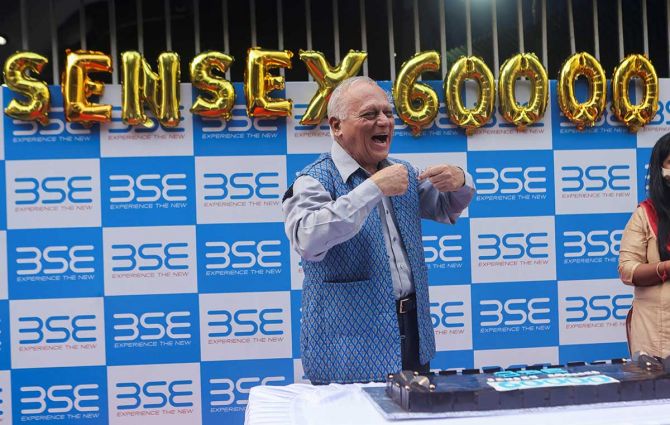'It is far too early to celebrate the numbers.'
'They are still fairly weak compared to the pre-pandemic level.'

Former chief economic advisor Arvind Subramanian on Friday cautioned against celebrating economic recovery so early as the economy is just bouncing back from the big decline of the previous year.
New Delhi's policy of raising import tariffs and not signing international agreements would not help in shifting investors from China to India and would harm exports, Subramanian warned.
"The GDP is barely back at the pre-pandemic level and IIP (the index of industrial production) is still below pre-pandemic level, Subramanian pointed out.
"We are mistaking or there is a risk that we mistake the natural bounce back from the big decline. It is far too early to celebrate the numbers. They are still fairly weak compared to the pre-pandemic level," Subramanian said at his lecture delivered in the honour of the late RBI deputy governor Subir Gokarn.
However, he said tax revenues are doing well and that may be a harbinger that things will improve, going forward.
"But what I would say is that recovery is still work in progress," Subramanian said at the lecture, organised by the Indira Gandhi Institute of Development Research.
The economy, he said, had already collapsed during the pre-Covid period of 2019-2020 as was reflected from various data on investments and consumption.
However, the official data only showed that there is a deceleration in economic growth at four per cent.
The former CEA said normal or potential GDP growth rate was four per cent during 2013-2014 to 2018-2019 rather than seven per cent shown by official data.
"When we come back to the recovery, potential or normal growth has to be seen in the context of what happened between 2013-2014 and 2019-2020. More factual assessment of that period was needed than perhaps what official numbers might suggest."
He disclosed that he had told then finance minister Arun Jaitley a few months before he died that the case of supportive monetary and fiscal policies had weakened because the data did not show that the economy collapsed during 2019-2020.
On raising tariffs, Subramanian said if you raise tariffs, input costs go up.
"When you combine that with the policy of staying away from international agreement, the two play off each other. Investors are fleeing China because it is becoming uncompetitive and wages are rising," Subramanian pointed out.
"The investors want to locate in a place where they can use it as a launching pad for exports. India may be a biggish market, but those investors don't want to come here just for the Indian market," he said.
Subramanian said the productivity-linked incentives (PLIs) give benefits mostly to tech and capital-intensive sectors.
"If we want inclusive growth in India, we need unskilled labour-intensive growth. This is not the broad thrust of PLIs," he said.
"Both society and politicians in India are sensitive to high inflation. That makes the task of the central bank in India much easier to address high inflation," he added.
"I think that will get reflected in policy actions, both by the Centre and the Reserve Bank. I am kind of cautiously optimistic that policy will respond effectively over the medium term to make sure that inflation and inflationary expectations don't get out of control."
"Stock markets reflect the Indian economy less. It would be a kind of policy mistake to infer from this (stock boom) anything about the diverse Indian economy," cautioned Subramanian.
"Twin balance sheet problems (of big and tech companies) may have come down. But other balance sheets are getting stressed, such as those of MSMEs and consumers."
*Kindly note the image has been posted only for representational purposes.
Feature Presentation: Ashish Narsale/Rediff.com












 © 2025
© 2025